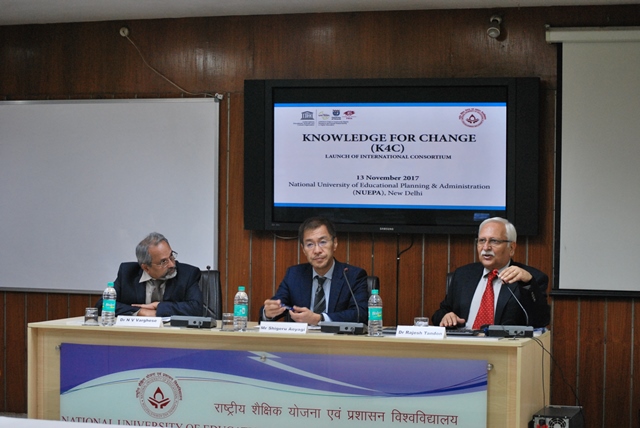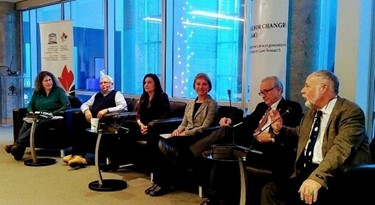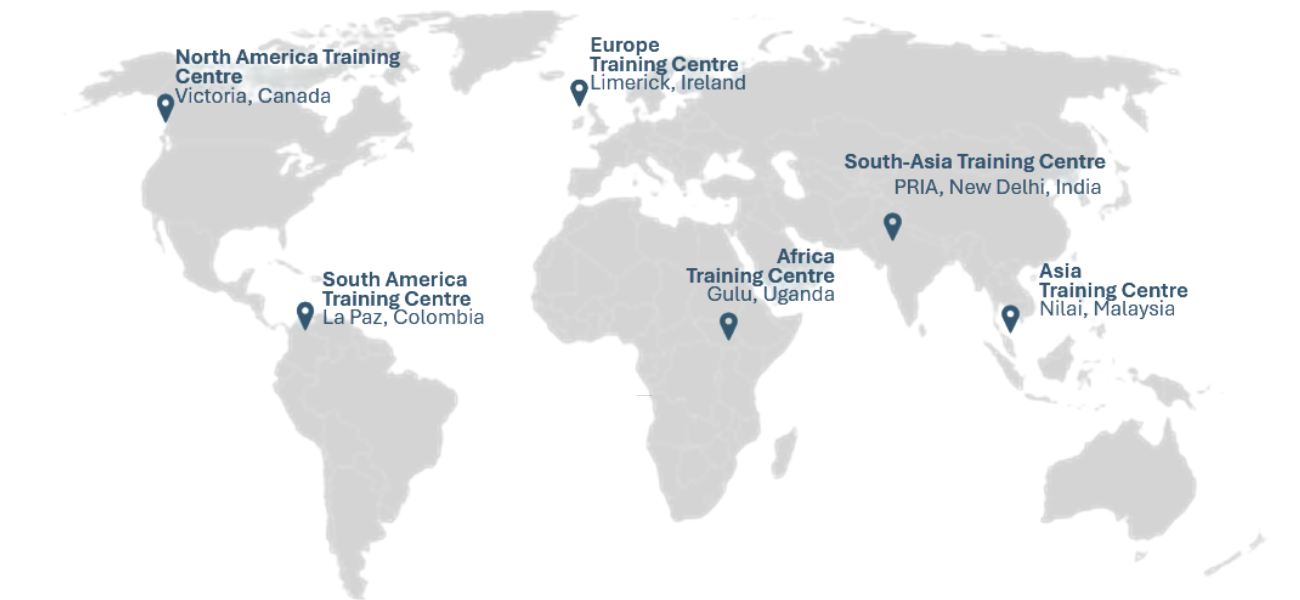Knowledge for Change (K4C)
The Knowledge for Change (K4C) Global Consortium for Training in Community-Based Participatory Research was created during the UNESCO Chair’s second term (2016-2020). The formal launch of the K4C Consortium took place on 13 November 2017 in New Delhi, in collaboration with the UNESCO New Delhi Office and the Indian Association for Universities. The Canadian launch occurred subsequently in December 2017, with joint efforts from the University of Victoria and the Canadian Commission for UNESCO.
India Launch
The launch of the Knowledge for Change (K4C) Global Consortium marked a landmark moment in the evolution of global research collaboration, capacity building, and knowledge democratization.
This milestone event took place on 13 November 2017 at the National University of Educational Planning and Administration (NUEPA) in New Delhi, India.


This event was attended by over fifty participants, including civil society practitioners, academic leaders, and students from across the globe- spanning countries such as Canada, Indonesia, Italy, Spain, Uganda, and further. The rich diversity of participants underscored the truly international spirit of the K4C Consortium and its dedication to fostering a globally connected movement for CBPR. The gathering created a dynamic space for cross-cultural dialogue, peer learning, and the sharing of grounded practices.- highlighting the necessity of collaborative approaches to knowledge creation in the contemporary world.
Canada Launch
 Following the Indian launch, the Canadian Commission for UNESCO and the University of Victoria hosted the Canadian launch of the K4C consortium in Ottawa, Ontario, Canada, on December 14, 2017.
Following the Indian launch, the Canadian Commission for UNESCO and the University of Victoria hosted the Canadian launch of the K4C consortium in Ottawa, Ontario, Canada, on December 14, 2017.
The event witnessed engaging discussions on the relevance of Community-Based Research, with notable attendees including the Co- Chairs- Dr. Budd Hall, Dr. Rajesh Tandon, Dr. Sebastian Goupil (Secretary General of the Canadian Commission of UNESCO) Dr. Joanna Ochaka (Vice-Chair, CBRC,Canada) Dr. Martin Taylor (Executive Director, Canadian Research Data Centre Network) Dr. Crystal Tremblay, Research Director, UNESCO Chair, and Dr. Walter Lepore, Project Director, UNESCO Chair.
The launch event signified more than the beginning of a new initiative—it marked the coalescence of a global commitment to reimagining the role of knowledge in society. By centering community voices, fostering international collaboration, and embedding social responsibility into research practices, K4C has laid the foundation for a transformative shift in how knowledge is created, shared, and applied. The event served not only as a celebration of a collective vision but also as a call to action for universities and civil society to work hand in hand in building a more just, inclusive, and sustainable world through community-based participatory research.
The K4C consortium was created to address the globally observed gap in community-university engagement and prepare the next generation of community-based participatory research (CBPR) practitioners and academics. Through the K4C consortium, the Co-Chairs, Dr. Tandon and Dr. Hall, sought to answer the question of how to create sustainable structures for building capacity in CBPR. The resulting K4C strategy facilitates formal partnerships between universities and community or practitioner organizations through community-university engagement. The consortium also highlights the creation of K4C hubs for training through hands-on community-based research (CBR) linked to the UN Sustainable Development Goals (SDGs).

In May 2021, the K4C was featured at the UNESCO World Conference on Higher Education in Barcelona. In November 2022, the K4C model was featured in the opening UNITWIN plenary panel for the UNESCO Conference on Transforming Knowledge for Just and Sustainable Futures. The K4C model has also been adopted by the University Grants Commission (UGC) in India as an approach for training academic staff in all public universities of the country.
In 2024, the Chair opted to transition the recruitment and training of K4C mentors from a centralized UVic-PRIA model to a regional approach. Since its launch in 2017, the K4C’s cost-effective, high-impact model has trained 160 mentors in 9 cohorts across 24 hubs. The mentors have then gone on to create these local and regional K4C hubs in 16 countries, including Canada, Cuba, Colombia, India, Indonesia, Ireland, Italy, Malaysia, South Africa, Tanzania and Uganda.



 --
--